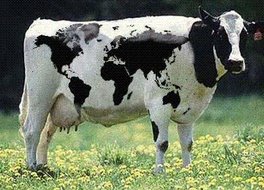Farm animal vet shortage prompts fears of disease outbreaksI disagree with their explanation for the reason, though. Although some may choose to switch to small animal for the money, it's more likely for the ability to not get beat up on the job -- large animal vets don't have an easy life, physically. The biggest reason, though, is that relatively more people are applying to vet school with NO large animal experience and no desire to work in rural areas with food animals. Therefore, we're admitting more small animal-minded people and they're not being convinced to change their plans. Why would they be? The curriculum in vet school is becoming more focused on the interests of the majority, which means the food animal subjects getting squeezed out for topics like oncology (a required course and rotation at Cornell now, but happily not until I left).
By Ann Bagel Storck on 5/1/2007 for Meatingplace.com
Surveys by the American Veterinary Medical Association indicate a shortage of farm animal veterinarians, which the organization fears could lead to disease outbreaks.
Although AVMA estimates the shortage at only 4 percent, that doesn't necessarily mean the situation isn't critical. "It's not like the other 96 percent can pick up the slack," Dr. Lyle Vogel, director of AVMA's animal welfare division, told the Associated Press. "Because of the distances and workload of the remaining veterinarians, they just can't fill in that shortage."
AVMA's findings echo those of another study conducted last year. (See Vet shortage could threaten food security, Meatingplace.com, June 2, 2006.) The shortage could be due to a large number of veterinary school graduates choosing to pursue small animal medicine with its perceived regular hours and better pay.
In response to the shortage, the National Academy of Sciences in March started an 18-month study to find gaps in veterinary care and look for ways to coordinate resources to fill them. USDA's Animal and Plant Health Inspection Service also has launched a pilot program that admits one student from each of the nation's 28 veterinary schools to a course focused on handling emergency disease outbreaks.
What do we do about it? Recruit. Maintain. Encourage. Fund. The program that APHIS is referring to does not select for food animal interest, but general interest, and I'm sure plenty of the attendees are not food animal-minded. How about a program that provides a good scholarship to one or two farm animal students at each vet school every year? That might be a little more efficacious. Money does talk.

No comments:
Post a Comment